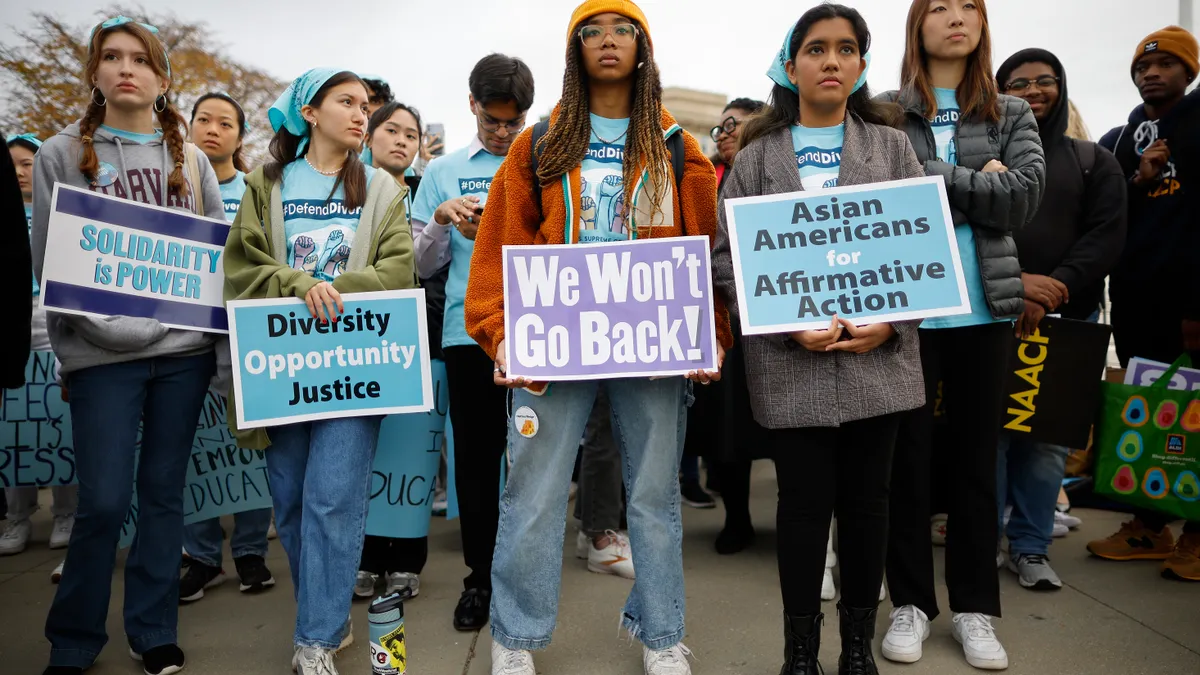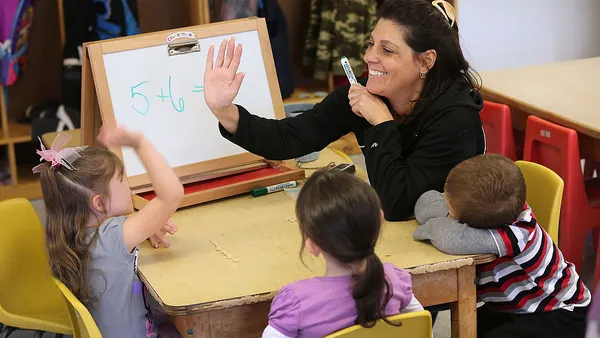Dive Brief:
-
On Monday, the U.S. Supreme Court heard two separate but related cases on the constitutionality of affirmative action in college admissions that could impact how high school seniors navigate their postsecondary applications and how counselors and educators guide them through the process.
-
In Students for Fair Admissions, Inc. v. University of North Carolina, the justices will consider whether race-conscious admissions violate the 14th amendment. In Students for Fair Admissions, Inc. v. President & Fellows of Harvard College, they are looking at whether the practice violates Title VI of the Civil Rights Act, which protects against race or nationality-based discrimination.
-
Advocates for race-conscious admissions say the practice contributes to diversity and equity in admissions. Opponents, however, argue that it unfairly discriminates against students, such as those who are White or Asian, who have historically outperformed Black and brown students.
Dive Insight:
Considering race in college admissions puts pressure on high school students applying to colleges, said Mike Gonzalez, a senior fellow at The Heritage Foundation, a conservative think tank.
"Throwing race into the mix only makes this very stressful time worse," Gonzalez said. "They feel that they have to find something in their past — something in their family history — that allows them to present themselves as a victim of society, because they feel that this will help them get into a top school."
On the other hand, getting rid of race-conscious admissions "doubles down on the systemic inequities these students face and can further discourage many from seeing themselves in college," said David Hawkins, chief education and policy officer for the National Association for College Admission Counseling, in an email.
"So school counselors, college advisors, teachers, and administrators will face a steeper uphill climb to encourage these students to persist despite the obstacles in their way and despite the constant and pervasive sense that these students gain admission ‘because of their race,'" Hawkins said.
If the Supreme Court decisions swing against race-conscious admissions, Hawkins said, school counselors and college advisors will become even more important in advocating for underrepresented students.
Inequities in the K-12 education system — around funding, access to coursework (particularly college preparatory coursework), access to school counselors and college advisors — "are likely to be the subject of intensified debate and activism, since these inequities are a large part of why postsecondary institutions face the prospect of trying to adjust for such widely varying experiences among students," Hawkins said.
The Supreme Court justices, who seemed split among ideological lines, spent the better part of Monday's five-hour session dissecting arguments for and against affirmative action.
The high court's newest justice, Ketanji Brown Jackson, provided an example of two applicants: one, a legacy student applicant who cites their family's generational history of attending the institution as a motivating factor, and the other, a Black student who cites their family history of slavery that prevented their family from attending the institution.
"He just wants to have it honored," Jackson said about the Black student's family history, "just like the other person has their personal background — family story — honored." However, in the Black student's example, race is intertwined with the student's history, Jackson said.
Jackson said she worried that overturning affirmative action would mean "that in the context of a holistic review process, the university can take into account and value all of the other background and personal characteristics of other applicants, but they can't value race."
On the other hand, Justice Amy Coney Barrett referred to a heavily cited case from 2003, Grutter v. Bollinger, in which the Supreme Court ruled 5-4 that a narrowly tailored use of race is allowed in the admissions process to achieve a diverse student body.
This case, Barrett said, said "using racial classifications are so potentially dangerous." Barrett said the 2003 case suggested that considering race in admissions "has to have an end point."
"How do you know when you're done?" she asked.
Currently, there are nine states that have barred the use of race in their college admissions program, according to numbers cited in Monday's oral arguments. Recent polls have shown the American public opposes considering race in admissions.
According to a poll conducted by The Washington Post and George Mason University's School of Policy and Government in October 2022, 6 in 10 Americans support a ban on the consideration of race in college admissions. However, roughly the same majority of the 1,238 respondents in the national sample also supported programs to boost racial diversity on campuses.
Another poll, conducted in March 2022 by the Pew Research Center, found only 7% of 10,441 respondents said race or ethnicity should be a major factor in considering college admissions. In contrast, 61% of Americans said high school grades should be a major factor.
In that poll, Black, Hispanic and Asian poll respondents were more likely than White respondents to say race and ethnicity should be a major factor.











